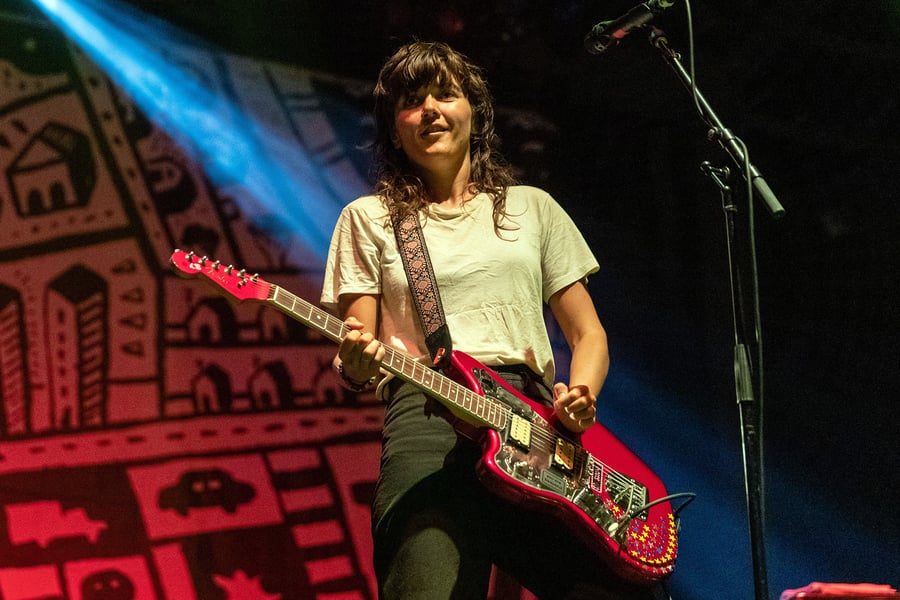The world has watched in horror in recent months as devastating brushfires have torn through Australia, claiming 24 lives and displacing thousands of families. For Courtney Barnett, who lives in Melbourne, not far from some of the worst-affected areas, the crisis has hit close to home.
This week, the singer-songwriter helped organize a pair of emergency relief shows with fellow Melbourne act Camp Cope, raising close to 90,000 AUD (approximately $62,000) for First Nations fire relief funds, wildlife rescue groups, and other organizations. Barnett and Camp Cope are also auctioning off a signed Fender Jaguar guitar, with bids past 3,000 AUD with five days remaining. “The shows sold out within two hours,” she tells Rolling Stone. “It was incredible to see everyone. People are so generous.”
Barnett, who begins a solo American tour on January 20th, called before a show in Castlemaine, Australia, to talk about the fundraisers, the anger her country is feeling at Australian Prime Minister Scott Morrison’s response to the crisis, the country’s history of colonial oppression, and more.
The whole world is watching Australia right now. How are people feeling where you are?
It’s a really low mood. People are angry and upset and scared and feeling hopeless — and trying to find ways to help out of that hopeless feeling. People have banded together really strongly out of desperation and a lack of help and guidance from our government. Communities have banded together to make change and protest. People just want to help.
You mentioned anger at the Australian government’s response to this crisis. What are people angry about, specifically?
We’ve always had bushfires in this country. It’s not like it’s a brand new thing. I think people are angry because it’s about more than that. It’s about climate change denial, and it’s also a class war. There’s volunteer firefighters who the government refuses to help. The government have taken away funding from those people. And not to mention that our country, white Australia — we stole the land from indigenous people, and then we’ve ruined it over the last 200 years. And the government, our leadership, shows no empathy or care.
How closely has this disaster affected your life and the people you know?
Where I am, in Melbourne, it’s relatively safe. We’ve had days where extreme smoke haze is blowing down from nearby affected areas. I’ve had reports of some friends and their families. I know people that have lost their entire house. Seeing these devastating photos and videos online; half the wildlife just dead. Entire species probably extinct. I feel bad. But that’s where the anger comes in. There were so many preventative things that could have been done and that could have been done quicker, but they weren’t. The response along the way doesn’t make it any inch better.
How did the fundraiser shows you played this week come together?
I was texting with my friend Thomo; she plays drums in a band called Camp Cope. She was like, “How are you today?” I was like, “Absolutely annoyed and depressed. I don’t know what to do.” She said, “Me too.” And we said, “All we can do is do a show.” Within an hour, she’d emailed the Corner Hotel and asked if they could help us out. It was my band, her band, and another friend’s band called Alice Skye. I made a poster quickly in Photoshop. Within 24 hours, we’d organized and sold out one show, so we did another. It was just so heartwarming to see everyone come together to try to make the best of where we are.
Love Music?
Get your daily dose of everything happening in Australian/New Zealand music and globally.
What were the shows themselves like?
Corner Hotel is one of the iconic Melbourne venues, a really great 800-person room. When I first moved to Melbourne, it’s where I always aspired to play. There was a strange mixture of people feeling this communal despair, but trying their best to do something. The good thing about music is people can come together and experience that feeling together, and that shared energy is pointed in a positive direction. It doesn’t alleviate things, but it’s a momentary relief and an inspiration to work harder and keep fighting. I had grand visions of doing Patti Smith’s “People Have the Power” as a group singalong or something, but there wasn’t enough time to learn it. But the message was there.
The flyer you made for the shows acknowledges that they were held on land that traditionally belonged to the indigenous Wurundjeri people.
It’s one of the most important things here. We can talk about how [the crisis] affects us and our future, but a lot of the time we forget that it’s stolen land. We’ve slowly ruined it, and we don’t listen to people who know more about the land than we do. It’s important to keep talking about that. How do we fix that in the future, not just to slap a Band-Aid on it?
You’re coming to the U.S. later this month for a solo tour. What are your plans beyond that?
It’s a little bit of a struggle to know what to do. I’m looking forward to the tour, but it feels a bit strange. This rearranges priorities a bit. For this year, my plan was to work on the next projects — I’ve got a few collaborations lined up — and to write. It’s important to remember to live and to experience and to have something real to write about. Not just to sit in a room and write an album for the sake of making an album and then touring it. To actually learn and to grow and to have real ideas and stories to share. That’s always my focus for writing songs. I don’t want to just write them for the sake of it. I want to share something that’s useful.



































